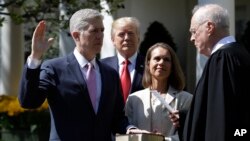On a gorgeous spring morning in the White House Rose Garden, Neil Gorsuch was sworn in Monday as the 113th Supreme Court justice, filling the seat vacated by the death of Antonin Scalia 14 months ago, bringing the bench to full strength, and restoring its previous ideological balance.
It was the culmination of an ugly political battle that changed the workings of the Senate, damaged its reputation for collegial debate, and removed once and for all the illusion that the selection of Supreme Court justices is non-political.
With President Donald Trump looking on approvingly in the warm sunshine, the 49-year old Gorsuch took the oath of office from Justice Anthony Kennedy, whom he once served as a law clerk. This is the first time a sitting justice will hear cases on the bench alongside a former clerk.
“Our country is counting on you to be wise, impartial and fair; to serve under our laws, not over them, and to safeguard the right of the people to govern their own affairs,” Trump told Gorsuch, a former Colorado appellate court judge. “I have no doubt you will rise to the occasion, and that the decisions you will make will not only protect our Constitution today, but for many generations of Americans to come.”
WATCH: Trump's remarks before Gorsuch swearing-in
Moments after taking the oath, the new Justice Gorsuch told a packed Rose Garden crowd he is humbled by the trust placed to him.
"I won't ever forget that the seat I inherit today is that of a very, very great man," he said, referring to Justice Scalia. “And I promise you that I will do all my powers permit to be a faithful servant of the Constitution and laws of this great nation.”
Gorsuch’s admiration for the man he replaced suggests he will continue Justice Scalia’s support for the concept known as the “unitary executive,” which favors stronger presidential power on foreign matters, including the conduct of war.
WATCH: Gorsuch's remarks after his swearing-in
“There is ongoing litigation to try to challenge the extent of presidential war powers with regard to ISIS,” says Stephen Griffin, professor of constitutional law at Tulane University in New Orleans. “If a challenge were to go up to the court on war powers, I think he would not be in favor of restricting presidential power in this area.”
The elevation of Justice Gorsuch restores the political balance on the Supreme Court that existed before Scalia’s death, with four justices considered reliably conservative, four who vote consistently liberal, and Justice Kennedy, a moderate seen as the most influential justice because he is considered the "swing vote" on the court.
Stephen Wermiel, professor of constitutional law at American University in Washington, says that while Gorsuch restores the court’s traditional balance, a second Trump appointee could throw the court into uncharted territory. He notes that two of the three oldest justices, Ruth Bader Ginsberg and Steven Breyer, are members of the liberal wing. The other is the swing vote, Kennedy.
“Instead of the 4-1-4 make-up, you then have five conservatives, and it becomes a 5-1-3 court with a solid working conservative majority that has never really existed,” Wermiel said. “Republicans have been vowing for decades to have a solid working conservative court, and remarkably, for almost 50 years, they haven’t quite been able to achieve that ready majority. That would be a dramatic historic moment if it happens.”
Conservative activists attending the Gorsuch swearing were excited about a possible shift in the court’s balance.
“It’s not about moving it to the center or right. I think it’s simply following the Constitution,” said Matt Schlapp, chairman of the American Conservative Union. “That’s what conservatives - all Americans - want. They want the hijinx and the politicizing to stop. And to follow what the law says and what the words say.”
Legal scholars soon will have a chance to see Justice Gorsuch in action when the Supreme Court meets to take up the final 13 cases of the current term. He will not be able to vote on cases brought up before he was sworn in. He may, however, have a decisive role to play when the court hears a controversial case April 19 on the extent to which the government can support religious institutions.







